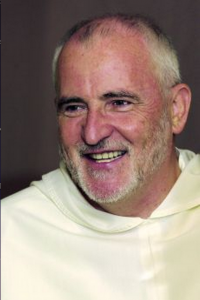Festen for Kristi legeme og blod, år A
Følgende er et utdrag fra ‘Laude Sion – Sequence for the Mass of Corpus Christi’ i Paul Murrays bok Aquinas at Prayer.
In Lauda Sion St Thomas underlines over and over again the newness of the eucharistic meal. Christ is ‘the new king’ and, at his table, what is being celebrated is ‘the new Pasch of the new Law’, a meal that brings to the end, once and for all, the old ways of religion and religious practice.
Vetustatem novitas, umbram fugat veritas, noctem lux eliminat.
Now the new the old replaces, truth away the shadow chases, light dispels the gloom of night.
One detail which should not be overlooked here is the reference to the ‘New Law’, an event of grace which St. Thomas links with the institution by Christ of ‘the new Pasch’. The actual term, ‘new law’, occurs most memorably, of course, in St Paul. Thomas follows the Apostle in the way he speaks of the law of the ancient covenant and the grace of the New. The New Law, in apparent contrast to that of the Old, is not written on tablets of stone, but on the innermost hearts of men and women moved by the Spirit. By emphasizing in this way the newness of the New Law, St Thomas is not for a moment intending to suggest that the God of Israel has somehow turned against his own people, and broken the covenant. ‘It would be incorrect,’ Jan-Heiner Tück observes, ‘to construe that Thomas’s intention here was to articulate a radical discontinuity between the Old and New Testament. In his understanding of the history of salvation, there is rather a firm continuity insofar as the Old Testament prefigures the salvation which is found in the coming of Christ.’
Believers, living now under grace, can be considered as, in some real sense, ‘a law unto themselves’ (ipsi sibi sunt lex) Rom. 2.14. For the law they are moved to follow is, first and last, a law of freedom. St Thomas notes, in his Commentary on 2 Corinthians (3.17), that ‘wherever the Spirit of the Lord is present, there is freedom.’ And he goes on to say:
‘The free man is one who exists for himself (est causa sui), but the slave exists for the sake of the master. Therefore, whoever acts of himself acts freely, but one who is moved by another does not act freely. Therefore one who avoids evils, not because they are evil, but because of God’s command, is not free. But one who avoids evils because they are evils is free. But this is done by the Holy Spirit who perfects the human person inwardly with a good habit, so that from love that person avoids evil, as if the divine law had commanded it. Consequently, he is called free, not as though he is not subject to the divine law, but because he is inclined by a good [internal] habit to do what the divine law ordains.’
The word ‘dogma’ is not a word people are nowadays inclined to associate with freedom. But, for Thomas, ‘dogma’, or doctrine, in this case, represents only one thing: the wondrous, liberating truth and miracle of Christ’s presence in the Eucharist.
Dogma datur Christianis, quod in carnem transit panis, et vinum in sanguinem. Quod non capis, quod non vides, animosa firmat fides, praeter rerum ordinem.
This is the truth each Christian learns, bread into his flesh he turns, wine becomes his holy blood. Though we feel it not, nor see it, ardent faith which now reveals it, all defects of sense make good.

Paul Murray OP